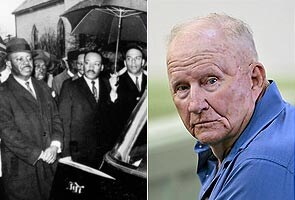
New York:
James Bonard Fowler is 77 now, but in 1965 he was a young Alabama state trooper facing the rising tide of the civil rights movement.
On Monday, at the Perry County Courthouse in Alabama, that past came calling: Mr. Fowler, who is white, pleaded guilty to the 1965 killing of a black man whose death led to the historic civil rights marches from Selma to Montgomery.
Mr. Fowler will face six months in prison for the fatal shooting of Jimmie Lee Jackson, a 26-year-old civil rights marcher who died after a confrontation with the police in Marion, Ala. His death inspired the first of the famous Selma marches the next month, an event that also ended in violence.
In the courthouse Monday, with Mr. Jackson's family watching, Mr. Fowler apologized for the shooting and pleaded guilty to misdemeanor manslaughter, but insisted that he had acted in self-defense, believing that Mr. Jackson was trying to grab his gun.
"I was coming over here to save lives," he said. "I didn't mean to take lives. I wish I could redo it."
The plea agreement brought to an end a case that had crept through the justice system for decades. In the 1960s, two grand juries investigated the killing but chose to not pursue charges. Then in 2004, Mr. Fowler confessed to a reporter for The Anniston Star that he had fired the gun.
"Jimmie Lee Jackson was not murdered," he said in the interview. "He was trying to kill me, and I have no doubt in my mind that under the emotional situation at the time, that if he would have gotten complete control of my pistol, that he would have killed me or shot me. That's why my conscience is clear."
But Mr. Fowler's plea on Monday suggests that he was not certain he would win the case in a courtroom. The district attorney who prosecuted the case, Michael Jackson, said he planned to try to convict Mr. Fowler of murder but was satisfied with the less severe manslaughter ruling.
"Time was starting to run out," Mr. Jackson said. "We wanted to make sure justice was done before he died."
Others questioned whether the sentence was harsh enough. The Perry County commissioner, Albert Turner Jr., told the Anniston newspaper that the agreement was "a slap in the face of the people of this county."
But John Fleming, the Anniston Star reporter to whom Mr. Fowler confessed, said the plea had brought "an appropriate end" to the case for a region still grappling with its civil rights history. "One thing we've never experienced in the South is anything close to a truth and reconciliation commission," he said. "What happened today was a moment of that experience."
On Monday, at the Perry County Courthouse in Alabama, that past came calling: Mr. Fowler, who is white, pleaded guilty to the 1965 killing of a black man whose death led to the historic civil rights marches from Selma to Montgomery.
Mr. Fowler will face six months in prison for the fatal shooting of Jimmie Lee Jackson, a 26-year-old civil rights marcher who died after a confrontation with the police in Marion, Ala. His death inspired the first of the famous Selma marches the next month, an event that also ended in violence.
In the courthouse Monday, with Mr. Jackson's family watching, Mr. Fowler apologized for the shooting and pleaded guilty to misdemeanor manslaughter, but insisted that he had acted in self-defense, believing that Mr. Jackson was trying to grab his gun.
"I was coming over here to save lives," he said. "I didn't mean to take lives. I wish I could redo it."
The plea agreement brought to an end a case that had crept through the justice system for decades. In the 1960s, two grand juries investigated the killing but chose to not pursue charges. Then in 2004, Mr. Fowler confessed to a reporter for The Anniston Star that he had fired the gun.
"Jimmie Lee Jackson was not murdered," he said in the interview. "He was trying to kill me, and I have no doubt in my mind that under the emotional situation at the time, that if he would have gotten complete control of my pistol, that he would have killed me or shot me. That's why my conscience is clear."
But Mr. Fowler's plea on Monday suggests that he was not certain he would win the case in a courtroom. The district attorney who prosecuted the case, Michael Jackson, said he planned to try to convict Mr. Fowler of murder but was satisfied with the less severe manslaughter ruling.
"Time was starting to run out," Mr. Jackson said. "We wanted to make sure justice was done before he died."
Others questioned whether the sentence was harsh enough. The Perry County commissioner, Albert Turner Jr., told the Anniston newspaper that the agreement was "a slap in the face of the people of this county."
But John Fleming, the Anniston Star reporter to whom Mr. Fowler confessed, said the plea had brought "an appropriate end" to the case for a region still grappling with its civil rights history. "One thing we've never experienced in the South is anything close to a truth and reconciliation commission," he said. "What happened today was a moment of that experience."
Track Latest News Live on NDTV.com and get news updates from India and around the world

